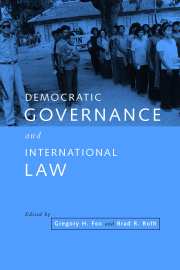Book contents
- Frontmatter
- Contents
- List of contributors
- List of acknowledgments
- Introduction: the spread of liberal democracy and its implications for international law
- PART I THE NORMATIVE FOUNDATIONS OF A RIGHT TO POLITICAL PARTICIPATION
- PART II DEMOCRACY AND INTER-STATE RELATIONS
- PART III DEMOCRACY AND THE USE OF FORCE
- PART IV DEMOCRATIZATION AND CONFLICTING IMPERATIVES
- 12 Intolerant democracies
- 13 Whose intolerance, which democracy?
- 14 Democratic intolerance: observations on Fox and Nolte
- 15 A defense of the “intolerant democracies” thesis
- 16 Democracy and accountability: the criss-crossing paths of two emerging norms
- PART V CRITICAL APPROACHES
- Index
15 - A defense of the “intolerant democracies” thesis
Published online by Cambridge University Press: 04 May 2010
- Frontmatter
- Contents
- List of contributors
- List of acknowledgments
- Introduction: the spread of liberal democracy and its implications for international law
- PART I THE NORMATIVE FOUNDATIONS OF A RIGHT TO POLITICAL PARTICIPATION
- PART II DEMOCRACY AND INTER-STATE RELATIONS
- PART III DEMOCRACY AND THE USE OF FORCE
- PART IV DEMOCRATIZATION AND CONFLICTING IMPERATIVES
- 12 Intolerant democracies
- 13 Whose intolerance, which democracy?
- 14 Democratic intolerance: observations on Fox and Nolte
- 15 A defense of the “intolerant democracies” thesis
- 16 Democracy and accountability: the criss-crossing paths of two emerging norms
- PART V CRITICAL APPROACHES
- Index
Summary
Since Koskenniemi and Roth take us to task for a number of positions we do not hold, it is important to make clear precisely the issue we address in our chapter. Our analysis centers on regimes that profess adherence to a system of “genuine periodic” elections. We ask whether these regimes may restrict the rights of political actors who represent a demonstrable threat to such a system of electoral choice. Many legal commentators, especially in the wake of the 1991 Algerian elections, answer in the negative by arguing that the essence of a fair electoral system is equal opportunity for competition among all opposition groups. Our chapter asks whether contemporary international law supports this view. After an extensive review of international jurisprudence and State practice we found – subject to important qualifications and standards of proof – that it does not. The international community has of late made a sufficient commitment to the creation and strengthening of electoral institutions for it to find value in efforts at their preservation. We found little basis for two alternative answers to our question: that international law has nothing to say to States seeking guidance on whether restrictions on opposition actors are legal or illegal, or that States are affirmatively prohibited from imposing such restrictions.
The basis for our answer is neither, as Roth suggests, commitment to a comprehensive international blueprint of democratic legitimism nor, as Koskenniemi claims, viewing national political struggles through a distorting “external” lens that either wholly fails to comprehend how the parties perceive themselves or selectively accepts the government's characterization of parties' “democratic” (or “undemocratic”) nature.
- Type
- Chapter
- Information
- Democratic Governance and International Law , pp. 445 - 448Publisher: Cambridge University PressPrint publication year: 2000
- 1
- Cited by

